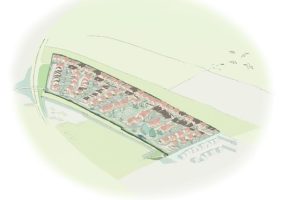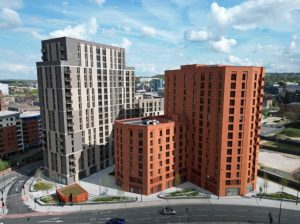Property Focus: The Interview

BITTEN by the engineering bug but without a degree or chartered status, newly-married Paul Waite financed himself through university by running a mobile disco and drawing plans for domestic extensions.
Two decades later and Skipton-based Paul Waite Associates has grown into a prominent civil and structural engineering design consultancy, providing designs for both developers and design/construct contractors.
The firm has taken on five new graduate engineers and technicians over the past year with five more planned as the company aims for turnover of more than £1.65m.
In his spare time, Waite is often found at Northern Soul events, walking at weekends with his wife Marilyn, and riding his Lambretta SX scooter.
1. What are your views of the current state of the commercial property and property development markets?
“Our industry is often regarded as a barometer for the UK’s economic performance. Historically, it’s always been a challenging environment but more so now with the recent reports that activity in the UK commercial property development sector is falling at its fastest rate since it started collating statistics five years ago.
“There is a degree of negativity and not all industry experts envisage a speedy upturn. Some experts do not see a speedy upturn and are predicting that the UK economy will shrink in the last two quarters of the year.
“Despite the pessimism that has arisen from a widening domestic downturn, our sights remain firmly fixed on growth. We’re well on target with our five-year business plan and we remain focused on key markets and securing further major projects. We’ll succeed in this tough climate by differentiating ourselves through our reputation for continuous improvement and design excellence as well as building strong personal relationships.”
2. What key challenges and pieces of legislation do you think will most affect your sector over the coming months?
“Increased government focus on the sustainability agenda is already having a major impact on the role of civil and structural engineering. We expect to see increasing legislation on sustainability and are working hard to anticipate it.
“The lack of available green spaces for development has prompted a rise in the popularity of brownfield sites especially where demand for residential and commercial property is high.
“We are also being brought in much earlier as developers turn to more complex contaminated land with geo-technical issues and problems of access and drainage. Our remit is to find out what is lurking underground and transform what was once seen as a difficult site into a buildable site.”
3. Why do you think Yorkshire is a good place to do business?
“It’s more than just a good place to do good business; it’s also a great place to live and to spend leisure time. These factors create a positive climate for enterprise. The region boasts a robust and diverse economy and has become recognised as a ‘business hotspot’, developing a reputation as a magnet for ambitious and enterprising organisations.
“Yorkshire offers a quality of life second to none and this helps to attract and retain investors, businesses and workers. It has a wealth of investment opportunities and room to expand.
“I’m confident that business looks promising for the region’s key cities. Bradford, a place close to my heart, is a model for city regeneration and retains a strong manufacturing base. Leeds continues to build its reputation as one of the largest UK financial and business service centres and has seen £2.5bn of investment in major commercial, retail and residential property developments during the past 10 years with almost £5bn more committed to current and future projects.
“Meanwhile, York, often regarded chiefly as a heritage hotspot for tourism, has nurtured a truly dynamic business environment centred on a fast growing knowledge-based economy. Sheffield is another success story seeing economic growth well ahead of the national average while attracting major players.
“Hull is also thriving business environment thanks to improved rail links, its strong city port and access to three international airports within a two-hour drive.
4. What is your favourite building/development in Yorkshire and why?
“It has to be Bradford’s vibrant regeneration programme. For too long, the city has been in the doldrums and failed to benefit from the success of Leeds but now the picture is beginning to look much different. The plan is bold and sets out to set Bradford apart from neighbouring cities while presenting a genuine, recognisable alternative to the business community.
“The vote of confidence in Bradford continues with £1.5 billion of construction work that will further transform the city. That includes a £300m redevelopment of the Broadway retail and leisure centre.
5. If you could improve anything in the region, what would it be?
“The region has so much going for it but if I had to make a change, it would be removing the region’s traffic bottlenecks. An effective transport network is the lifeblood of any successful town or city. Unfortunately, our region suffers too much congestion. I would invest in improved roads and public transport links.
6. What barriers have you had to overcome during your career and how have you overcome them?
“There have been two personal challenges. The first was financing my way through college. I was 24 and newly married and I was passionate about becoming an engineer. It was mentally demanding but with self belief and bags of energy, I made it happen.
“The second challenge was to get my work-life balance turned round. At one time, I was struggling – my 70-hour week meant little time for my family and personal life. I knew that this was unsustainable. Little by little, I was able to reduce this to 24 hours by learning to delegate effectively and by honing my leadership skills. It’s incredible but I feel much more effective.”
7. What was your first job and how did you enter your current line of work?
“I took a series of jobs after school including a role as a textile worker on a double-day shift, trainee manager at Silentnight, before drifting into a position at Pendle Council as a technician engineer.”
8. What do you most enjoy about your job?
“My improved work life balance now means I’m much better placed to work with my management team to develop the long-term strategy. I also enjoy implementing systems and processes that can accelerate our growth. I’m particularly proud of our five year plan which is something the whole team can get behind. We’ve also established profit centres giving greater autonomy to employees and added a profit-related bonus to teams that achieve their target.”
9. What is the best piece of advice you’ve ever been given?
“Get your life in balance. At work, delegate the detail to others. The benefits of work-life balance have been well documented but for me, it’s allowed me to set the vision, articulate the strategy and anticipate and react to changing market conditions. It’s also freed me to look at how we can ensure the needs of our clients are being best met as well as turn Paul Waite Associates into a business that people want to work for.”
10. And the worst?
“To invest in technology shares back in 2000. If only I’d had a crystal ball!”








